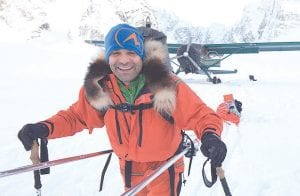Renowned Grand Marais adventurer Lonnie Dupre will try for the fourth year in a row to become the first man to climb (alone) North America’s highest peak, Mount McKinley (also called Denali) in the month on January, the coldest, windiest, darkest month of the year. Dupre has come close to reaching the 20,350 peak in the past, but bad weather has driven him down the mountain. Will this be the year he makes it safely to the top?

Say this for Lonnie Dupre, when he starts something, he doesn’t give it up easily.
So despite his announcement earlier this year that he was going to take a break from attempting a January solo summit of Mount McKinley, something he has tried the last three winters without success, it surprised few people when he recently reversed course and said he will try one more time to reach the 20,350-foot peak of North America’s tallest mountain.
Should Dupre reach the mountaintop, he will become the first person to climb alone to the peak in January, the coldest, windiest, darkest month of the year.
Despite not reaching his ultimate goal, Dupre has accomplished a lot on his first three climbs. Along the way, Dupre has chronicled the effects of global warming, and he has gathered microbe samples for Adventurers and Scientists for Conservation and for researchers working for Dragos Zaharescu, a Biosphere 2 project at the University of Arizona. These samples have been used to help scientists understand how climate change affects the production of living matter in extreme environments. His efforts have also brought attention to the world’s receding glaciers, and he has made a film, Cold Love, that depicts his many expeditions and advocates for saving “this fragile environment which impacts our planet.”
The film will debut on October 12 at Betsy Bowen’s Studio at 7 p.m.
Dupre will make a few small changes as he makes his way up Mount McKinley this time. Instead of building snow caves to sleep in, he will use a tent that will withstand the high winds on the mountains.
“I still have to do some digging. The tent’s roof can only be above the snow about a foot or so, but it should save me half an hour or so of digging every day, and on a long trip, that adds up,” Dupre said.
Dupre is also making some changes to his diet. “I am trying to make my diet more palatable. When you get up higher in altitude you lose your appetite, and you really need to eat. You need those calories to stay warm. A better-tasting diet should help with that. And I’m giving up caffeine. Even that morning cup of coffee hurts when it comes to staying hydrated.
“The other thing that I am going to do is to start out earlier this time. I want to arrive December 20, the first day of winter, and be on the mountain on December 21. That should give me more time to get the weather I need to make the summit in January. As the winter season progresses the weather gets more and more unstable.”
When he reaches the upper portions of the mountain Dupre said he would switch from a twopiece to one-piece suit. “It’s kind of like a snowmobile suit with a big fur hood. It should keep me warmer. It’s just one more thing that might give me that edge to reach the summit.”
As a world-renowned Arctic adventurer, Dupre, 52, has spent the last 30 years of his life preparing for and going on cold weather expeditions. He has traveled to the North Pole, to Siberia, across the frigid top of Canada, and with a friend, became the first duo to circumnavigate Greenland by kayak and dogsled.
Once again Dupre is getting his body in the shape necessary to pull a 200-pound sled behind him as he prepares to cross country ski from his base camp at 7,200 feet and make his way forward and upward. Most of his training will be done here in Cook County. “I will do some running, some weight lifting and hike with a heavy backpack,” he said.
In early December Dupre will either travel to Colorado or Washington to do some mountain climbing and acclimate his body to high altitude. “I will be testing some new crampons and an ice ax and work on my climbing skills,” Dupre said.
Three winters ago Dupre climbed to 17,200 feet but had to stop and hunker down in a small snow cave for almost a week as the mountain was buffeted by high winds and extreme cold. When the weather let up, Dupre was cold, tired and running short of food, so he had to make his way back down.
Two winters ago Dupre made it to 15,400 feet before once again weather forced him to stay put for seven days in a snow cave, and last winter he climbed to 17,200 feet, his last base camp before the summit, before grim long-range weather forecasts sent him down the mountain once again. Each time he has climbed, he has ended up spending about three weeks on the mountain, some of it waiting for weather to clear so he could climb, and some of it waiting for weather to clear so a plane could land to pick him up.
And if he doesn’t make it?
Dupre laughed. “Well, I guess I will keep trying then. But hopefully this year will be it.”


Leave a Reply